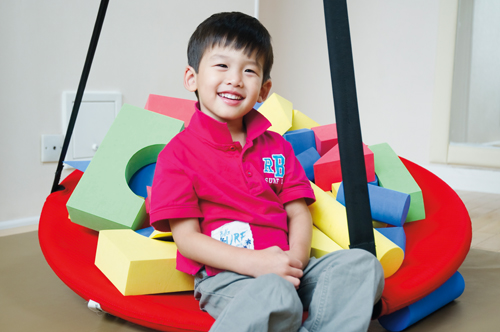 It is no secret that services, facilities and therapists for special needs children in Beijing are woefully thin on the ground. Sitting opposite Jacqueline Chen at a Sanlitun café, you get a sense of just how desperate the situation really is. Chen is the mother of 4-year-old Eliott and 2-year-old Elizabeth. Although cognitively
It is no secret that services, facilities and therapists for special needs children in Beijing are woefully thin on the ground. Sitting opposite Jacqueline Chen at a Sanlitun café, you get a sense of just how desperate the situation really is. Chen is the mother of 4-year-old Eliott and 2-year-old Elizabeth. Although cognitively
on-target, Eliott was born prematurely with cerebral palsy at Beijing United Family Hospital.
Each time Chen described her disappointment at the neglected state of special needs care in Beijing (which was regularly) she rapped her fingers on the tabletop. While it’s obvious that Chen has had her share of roadblocks, her finger tapping punctuations were loudest when talking about how, with a small team of dedicated parents and therapists, she was going to succeed where others had failed.
Named after her son, Eliott’s Corner (the sister branch of Shanghai’s Olivia’s Place) offers speech, physical and occupational therapy to children whose conditions range from mild to severe. As co-owner and general manager of Eliott’s Corner, Chen is emotionally, financially and personally invested in ensuring the center’s success. She has to be – it’s the only place in Beijing where her son can get the physical and occupational therapy that he needs.
When asked why she changed the name from Olivia’s Place to Eliott’s Corner for the Beijing branch, Chen admits that it was her husband’s idea to name the center after their son. She hopes it will leave the door open for other parents of special needs children to start a center in their corner of China in honor of their own child.
China does not have a reputation as a high-quality service provider when it comes to children with special needs. Chen’s initial interaction with hospitals and clinics in Beijing was not a positive one. While she’s quick to defend the pool of talented therapists currently working in the capital, she reveals that politics and a lack of professional communication often got in the way of Eliott’s care.
It was only when Chen spoke to a mother at a playgroup that she found out about a therapist for Eliott operating out of SOS International Clinic. Like many therapists operating in Beijing, he was a trailing spouse and has since moved on. Chen counts herself lucky that her family then moved to the US for a year, during which time Eliott received daily therapy sessions.
According to Chen, while speech therapists are relatively easy to come by as they don’t require much equipment or space to practice, occupational and physical therapists are highly sought after in Beijing.
The therapists who do work in Beijing tend to work from home or offer house calls, and while this provides a stopgap, it presents a new range of problems. Firstly, their therapy sessions are generally not covered by insurance, meaning parents must pay out-of-pocket. Secondly, as therapists move on, there is little continuity of treatment. “It’s just so fragmented. If that person leaves, you’re not sure if your case is going to be handled by someone else.”
Eliott’s Corner hopes to address the inevitable revolving door of therapists
by co-operating with Olivia’s Place in Shanghai. The two centers have
already traded therapists on a short-term basis to provide continuity of care during their staff’s summer holidays.
While there is certainly a lack of therapists in Beijing, it is not the only reason special needs care is lagging. Chen believes profit, or lack thereof, is the underlying reason for the dearth of special needs therapists. “The hospitals here don’t recognise the need for special needs because it’s not a big money turner for them. It’s so niche; there are other avenues for them to make money quicker.”
But is it possible that there are simply too few children requiring this type of care in Beijing to make investing in such services feasible? Based on the level of interest Chen has encountered from both international schools and parents, she doesn’t think so.
“Parents like me, who want to come to China, do the research andthere’s nothing available so they don’t come. So the hospitals think, ‘Okay, they’re not coming so we’re not going to provide the services.’ It is a catch-22 situation when the hospitals don’t want to invest because they don’t think there’s any need. But there is a need because there’s parents like me.”
Despite Beijing being home to a community of families with special needs children, there is little interaction or sharing of resources. Chen hopes that in addition to providing therapy, Eliott’s Corner can address the lack of communication and act as an informal community center.
She recalls a recent story of a mom who wanted to send her child to a speech therapist closer to their home, but in the end chose to travel the extra distance to Eliott’s Corner. “She just wanted to be in an environment where she could meet the other moms! She felt like she was talking about her child’s issues all the time to her friends and her friends could not relate. She just wanted a resource, a network.”
Eliott’s Corner also has a philanthropic arm: Olivia’s Place Foundation.
The foundation provides financial assistance to expat and local families who cannot afford all or part of the treatment costs for their children. The foundation is still in its growing stages and currently the demand is far greater than their resources. “With the foundation, we’ve helped a few kids, [but]we haven’t been able to help a lot. I have to admit that the foundation is out of funds.”
The foundation’s review board is made up of three doctors who review each case based on three criteria: the household’s income, the severity of the child’s case and how much progress the child is expected to make after therapy. Chen laments that there are just too many cases for their small foundation to handle. So in an attempt to focus their efforts, the foundation prefers to offer financial support to children who will see a marked improvement in their quality of life after receiving therapy. “Some of the kids may not be very severe, but if they could make a lot of progress with just some sessions of therapy, then they may be more qualified [for financial support]than the kids who are very severe.”
 Finally, Chen stops punctuating her sentences with her tabletop rapping and acknowledges that at the end of the day, she’s just a parent who decided that if she wanted to help her son, she had to do it herself. “I’m a customer, so Eliott is my Customer Client Number One. I know what we need, what the other parents need. And I’m coming from that perspective.”
Finally, Chen stops punctuating her sentences with her tabletop rapping and acknowledges that at the end of the day, she’s just a parent who decided that if she wanted to help her son, she had to do it herself. “I’m a customer, so Eliott is my Customer Client Number One. I know what we need, what the other parents need. And I’m coming from that perspective.”
Then, in walks Eliott wearing an ‘I Heart Mama’ t-shirt, his little sister Elizabeth not far behind. Without a hint of bashfulness, and on slightly unstable legs, Eliott finds a fuwuyuan, gets his hands on a menu and brings it back for his mother to read. It’s obvious that for Eliott, all of those hours of therapy have paid off.
RESOURCES
Eliott’s Corner 胡宝小屋
17C Golden Land Building, 32 Liangmaqiao Lu, Chaoyang District (6461 6283) www.oliviasplace.org 朝阳区朝阳区亮马桥32号
Care for Children
The only special needs school for foreign families in Beijing.
Unit 101, River Garden, 7 Yuyang Lu, Houshayu, Shunyi District (8470 2735, principal@careforchildrenservices.com) www.
careforchildren.com 顺义区顺义区后沙峪榆阳路7号裕京花园101室
Side by Side
A wholly foreign owned and run center providing support for children with special needs and learning difficulties.
Capital Paradise 3336, Shunyi Distrcict, Shunyi District (8046 3858, info@sidebysidebeijing.com) www.sidebysidebeijing.com 顺义区后沙浴名都园3336
This article is excerpted from beijingkids August 2011 issue. View it in PDF form here or contact distribution@beijing-kids.com to find out where you can pick up your free copy.




